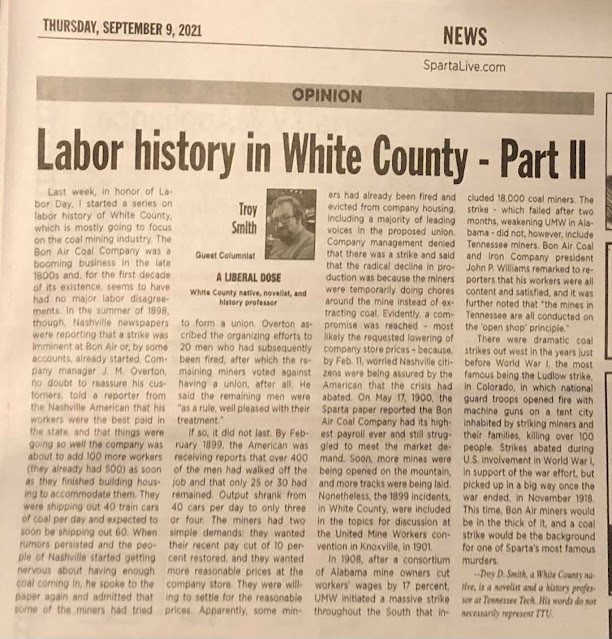A Liberal
Dose
September 9,
2021
Troy D.
Smith
“Labor
History in White County, Part 2”
(see Part 1 HERE)
Last week, in honor of Labor Day, I started a series on
labor history of White County, which is mostly going to focus on the coal
mining industry. The Bon Air Coal Company was a booming business in the late
1800s, and for the first decade of its existence seems to have had no major
labor disagreements. In the summer of 1898, though, Nashville newspapers were
reporting that a strike was imminent at Bon Air or, by some accounts, already
started. Company manager J. M. Overton, no doubt to reassure his customers,
told a reporter from the Nashville American that his workers were the best paid
in the state, and that things were going so well the company was about to add one
hundred more workers (they already had five hundred) as soon as they finished
building housing to accommodate them. They were shipping out forty train cars
of coal per day, and expected to soon be shipping out sixty. When rumors
persisted, and the people of Nashville stared getting nervous about having
enough coal coming in, he spoke to the paper again and admitted that some of
the miners had tried to form a union. Overton ascribed the organizing efforts
to twenty men who had subsequently been fired, after which the remaining miners
voted against having a union, after all. He said the remaining men were, “as a
rule, well pleased with their treatment.”
If so, it did not last. By February, 1899, the American was
receiving reports that over 400 of the men had walked off the job, and that
only 25 or 30 had remained. Output shrank from forty cars per day to only three
or four. The miners had two simple demands: they wanted their recent pay cut of
10% restored, and they wanted more reasonable prices at the company store. They
were willing to settle for the reasonable prices. Apparently, some miners had
already been fired and evicted from company housing, including a majority of
leading voices in the proposed union. Company management denied that there was
a strike, and said that the radical decline in production was because the
miners were temporarily doing chores around the mine instead of extracting
coal. Evidently a compromise was reached -most likely the requested lowering of
company store prices -because by February 11 worried Nashville citizens were
being assured by the American that the crisis had abated. On May 17, 1900, the
Sparta paper reported that the Bon Air Coal Company had its highest payroll
ever, and still struggled to meet the market demand. Soon more mines were being
opened on the mountain and more tracks were being laid. Nonetheless, the 1899
incidents in White County were included in the topics for discussion at the
United Mine Workers convention in Knoxville in 1901.
In 1908, after a consortium of Alabama mine owners cut
workers’ wages by 17%, UMW initiated a massive strike throughout the south that
included 18,000 coal miners. The strike -which failed after two months,
weakening UMW in Alabama -did not, however, include Tennessee miners. Bon Air Coal
and Iron Company president John P. Williams remarked to reporters that his
workers were all content and satisfied, and it was further noted that “the
mines in Tennessee are all conducted on the ‘open shop’ principle.”
There were dramatic coal strikes out west in the years just
before WWI, the most famous being the Ludlow strike in Colorado in which
national guard troops opened fire with machine guns on a tent city inhabited by
striking miners and their families, killing over a hundred people. Strikes abated
during U.S. involvement in WWI, in support of the war effort, but picked up in
a big way once the war ended in November, 1918. This time Bon Air miners would
be in the thick of it, and a coal strike would be the background for one of
Sparta’s most famous murders.
--Troy D.
Smith, a White County native, is a novelist and a history professor at
Tennessee Tech. His words do not necessarily represent TTU.
A complete list of Liberal Dose columns can be found HERE
A list of other historical essays that have appeared on this blog can be found HERE
Author's website: www.troyduanesmith.com
The author's historical lectures on youtube can be found HERE

No comments:
Post a Comment